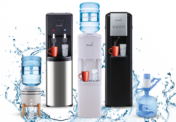Home and Office Delivery
20-oz ‘Fallen Off a Cliff.’ New Retail Data: Beverage Category Sales Slowed.
Read More
Q&A: Coke United CEO John Sherman
Wide-Ranging Interview Covers Distribution Complexity, "Significant' Planned Production Investment, E-Commerce and More
Read More
Q&A: Coca-Cola Consolidated COO Dave Katz
One Year After Refranchising, What’s Next for Coke’s Largest U.S. Bottler? Katz Sees Complexity Management, Segmentation Among Keys to Growth
Read More





